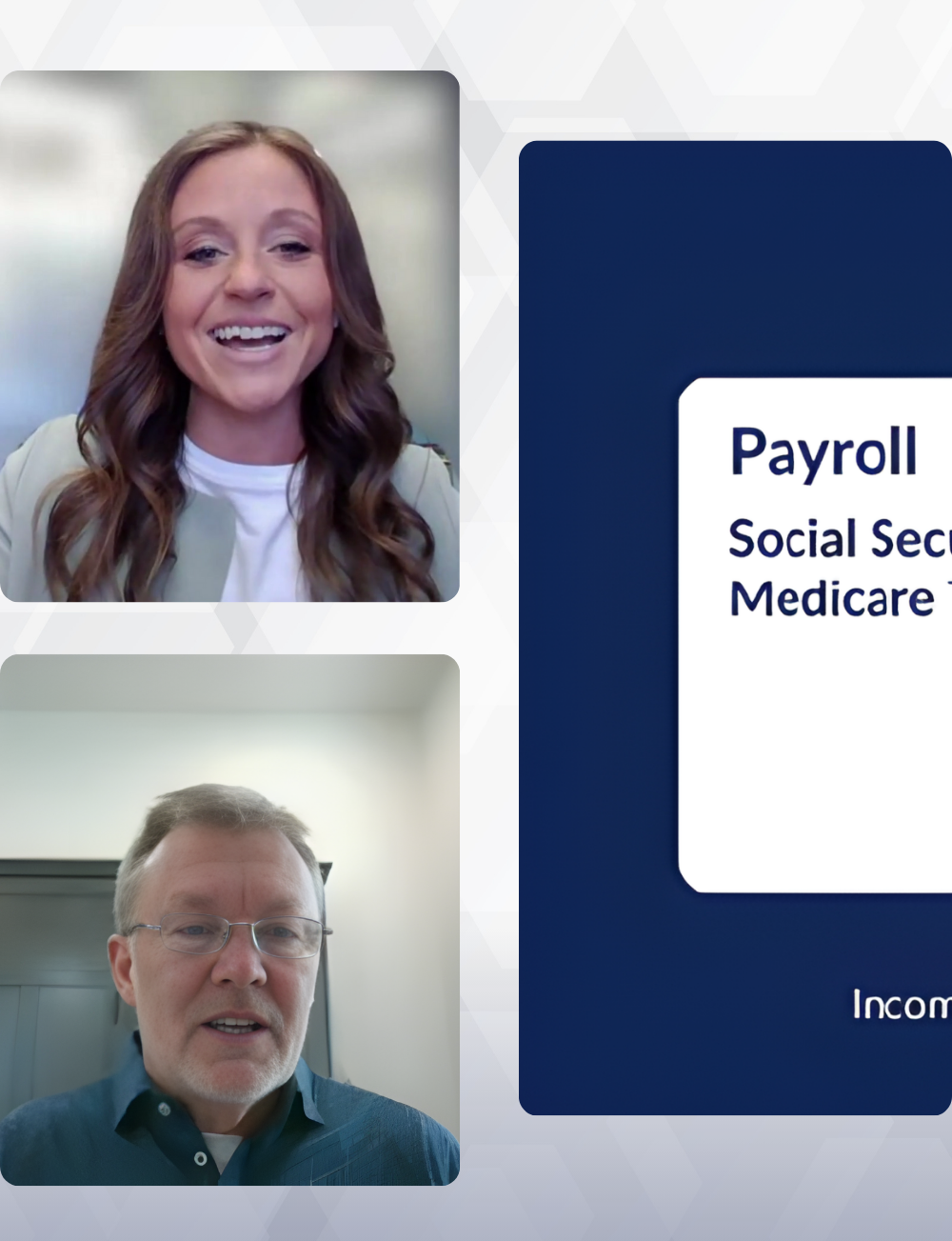Understanding Pay Schedules & Tax Basics

The Resource Center content, including all videos and other media, is for informational purposes only. You should not construe any such information or other material as legal, tax, investment, financial or other advice. The advice and information contained in the Resource Center is not a substitute for advice from a professional who is aware of the facts and circumstances of your individual situation
Transcript
So first thing we really wanted to dive into here are, you know, when you're getting paid, there are different pay schedules that you'll you will get.
So pay will be provided on a weekly or a biweekly schedule. So this the biweekly schedule is every other week. Obviously, weekly, you will get it every Friday.
We will adapt and adopt the pay schedule of the facility you go to. So each facility is not the same. So your friend, you know, if they're deploying to a different facility than you, might be a different pay schedule.
And the next big thing here, are your direct deposits.
So setting up your bank account on your arrival is a big part of it.
So you will set that up with your arrival coordinator. If your arrival coordinator is not able to help you with that, always reach out to your IES.
But the direct deposit, info ensures that you receive your salary and your hourly pay on time and correctly.
You'll be able to access all of your paychecks, through our workforce app. It's called ADP. So ADP, you can access it on, obviously, just their website, or they do have a great app that you can use to access it.
On your pay stubs, you know, you'll be able to see, you know, obviously, the big thing first is making sure that it you were paid correctly.
On those pay stubs are also your deductions.
So common deductions here in the US are obviously taxes.
So whenever you get paid from in the US, there are taxes. There are state, federal, and local income taxes along with any deductions for your insurance.
So when you're opening that up and accessing them on ADP, you will need to be double checking that.
You'll get access to these pay stubs every Thursday.
Typically, Thursday morning at the latest sometime around noon, but you will get paid, so you'll get your money on those Fridays.
And then, you know, really, the biggest thing here is, you know, if there are any issues with your pay, reaching out to your IES, and we can work back with the payroll team just to make sure that you are getting paid correctly.
Yeah. Definitely. And, you know, understanding your pay and understanding what your paycheck looks like, understanding those deductions that Nick mentioned, you know, is all very important, and we wanna make sure that you're understanding where that is coming from, understanding what amount is actually being transferred over to your bank.
All of this information is going to be available in the resource center for those of you who are part of the Passport USA program and are currently going through our program. If you are joining and you are not a member of the Passport USA program and maybe you're still weighing out your options, trying to think if healthcare cell is gonna be a good agency for you.
Unfortunately, you wouldn't have access to our resource center just yet, future if you do choose to join. So definitely, you know, use this as a consideration.
We've tried to provide you with all the information that you need in order to have you, you know, set up for success when working over in the United States, making sure that you understand everything correctly, and that information is provided very candidly to you.
Nick, we do have a couple questions coming in that I think would just be nice for us to hit on. Mhmm. I know we had some questions in our previous broadcast, so I know this is a concern from, you know, our health care professionals that are kind of going through this process. And we kinda lightly covered on this, but, Samina asked a really great question of how often do we submit our time sheet. So this might be something different than what they're currently used to doing at their facility, know, once they transfer over to working in the United States. So maybe we can touch base on time sheets.
Yeah. So the time sheets will be submitted again based off of your pay schedule. So if you're, you know, submit if you're getting paid weekly, you would submit it every Monday morning. Or, you know, we do recommend as well if you whenever you work your last shift of the week, submitting that time sheet.
Now, obviously, for biweekly, when you're working when you're getting paid every other week, you would have to submit that every other Monday.
But it is best practice to keep track of those hours throughout the week instead of just going back and trying to fill it in on those Mondays. But the expectation is for you to submit them, to the payroll team in your IES by Monday morning.
Awesome. Thank you.
Yeah.
I know that was, a big concern. And if there are any questions about timesheets, you know, you can always reach out to your international employee supervisor. That's what they're there for. They're there to help you and guide you. If you do have questions or concerns, I know from Ariel we had this come in. Hi Nick, maybe you could give us an example regarding paycheck with deductibles. Deductibles like taxes.
As Nick mentioned, if you drop the word pay in the chat, you are going to get a link, through your email that is going to give you a broadcast that breaks down all those deductions. So that way you can better understand your paycheck, what deductibles are coming out when he mentioned taxes, like state tax, local tax.
So if you're looking to get that breakdown, just comment pay in the chat, and we'll make sure to send over a
overtime. It is only once you have broken that forty-hour barrier.
The pay rate for overtime is one point five times your regular hourly rate. The pay rate for guaranteed is just that normal base rate.
And then typically for overtime, you do need, the facility approval.
And like I said, for the guarantee, you will automatically get it if you meet the requirements.
Additionally, with that, there are different pay structures within the US. We went over overtime, but you will also receive premium pay.
So these premium pay vary by facility, but you'll get some shift differentials for, you know, working in, a night shift, an evening shift, weekend shifts. Usually, those, you know, will get an increase in pay per hour.
But as I mentioned, each facility is not the same, and those are outlined on your assignment confirmation letter. There are also leadership roles, that you can get paid for additionally, which include preceptor or charge nursing. So being a preceptor, as I'm sure most of you are aware, you're getting you know, you're following a, you know, a new hire and helping them adapt the facility. You will all get one when you arrive in the US.
And then a charge nurse is basically when you are working as the nurse who is sort of, you know, in charge of the floor for that day.
Next big thing I wanted to kinda touch on here are the variations in your pay and how they fluctuate.
So each paycheck will look a little different each time you get paid, and that is because you are paid on an hourly basis.
So we pay for whatever hours you have worked, so that means it is not a fixed salary.
Obviously, week to week, you could work more you could work overtime one week, not work at the other, and then also get shift differentials. So each week, you know, it's not gonna be a hundred percent the same. It could it should be very close, to the same pay. But, again, you know, it is gonna be a little bit different depending on how much you work, what kind of shifts you're working, you know, anything along those lines.
Yeah. And when you, you know, start working over in the United States and you're at your facility, you're gonna know what your schedule is. So you're gonna know what your set hours are, so that way when you do start to dip into overtime I know had some questions coming into the chat on, you know, how overtime is defined and when, you know, you realize that you do start working overtime. So you're gonna know your set shift and like Nick mentioned too, you're gonna have those guaranteed full time working hours.
So once those hours, you know, have been worked and then any additional hours worked, that's when you kind of dip into your overtime hours. Yep.
All right. Let's see if we've got any other, you know, good questions. I know it's been asked if this information will all be recapped again. And this is definitely something that your international employee supervisor, will explain to you, you know, when you start working in the US. And again, if you you have questions about out to your current assignee, whether it be your IPA, your IDA, your IES, whoever you're currently working with at that time, they're there to, provide you guidance and assistance, and make sure that you're understanding everything, you know, of the stage that you're currently at in the process.
Related Resources
Keep Exploring More Resources
Looking for more guidance? Browse our full collection of resources to support you throughout your journey.
.webp)






.webp)